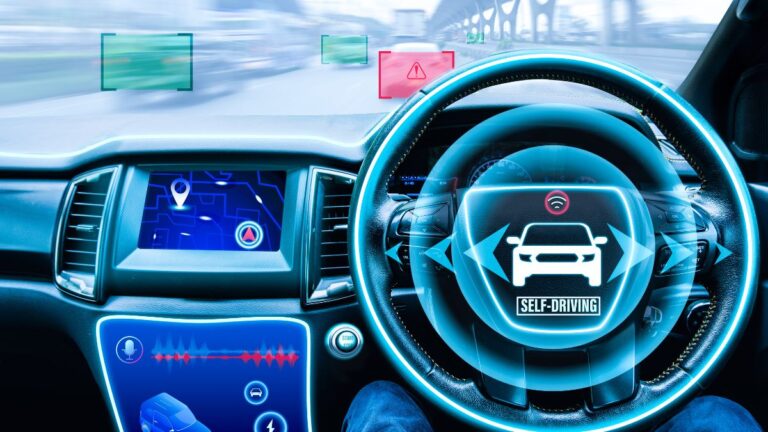Artificial intelligence (AI) has been playing a major role in the recent rapid developments of the automotive industry. Between 2022 and 2030, the global AI market for the automotive sector is expected to grow at a Compound Annual Growth Rate (CAGR) of 23%.
The impact of AI on the automotive industry is extensive, ranging from improved driver assistance to voice recognition and prolonging vehicle lifespan. Businesses can now better anticipate and evaluate consumer behavior, improve production methods, and develop cutting-edge products tailored to market demands.
What Machine Learning (ML) and Artificial Intelligence (AI) Mean for the Automotive Industry
What does machine learning (ML) and artificial intelligence (AI) mean for the automotive industry? And what benefit does working with a technology vendor to include AI solutions provide?
ML & AI in the Automotive Sector: What You Need to Know
The incorporation of AI and ML solutions has significantly accelerated this trend. The automobile sector has long been a center for technical innovation. These technologies provide various benefits for automobile manufacturers, from increased safety and cost-effectiveness to better user experiences. Automobile manufacturers can gain insightful information, improve operational efficiency, and develop cutting-edge goods that address market demands by incorporating AI and ML. This ensures a competitive edge in a rapidly changing market.
Principal Justifications for Using AI in the Automotive Sector
- Enhanced Safety: AI and ML algorithms can analyze a large amount of data from vehicles’ cameras, sensors, and other sources to identify potential hazards and predict driver behavior. These technologies enable Advanced Driver Assistance Systems (ADAS) to offer real-time assistance to drivers, reducing the risk of accidents and improving overall road safety.
- More Tailored User Experiences: Artificial intelligence in the automotive industry promotes more personalized user experiences for drivers and passengers. Infotainment systems, for example, can provide customized information, route suggestions, and entertainment options, enhancing user satisfaction and loyalty.
- Research and Development Enhancement: Automotive businesses can utilize AI and ML to enhance research and development activities, leading to cutting-edge products that meet evolving market demands. AI-driven simulation tools can improve vehicle designs, and ML models can optimize emissions, performance, and fuel economy.
- New Opportunities and Revenue Streams: AI and ML technology enables the automotive industry to identify new opportunities and revenue streams by analyzing trends, consumer preferences, and future growth areas. Businesses can innovate with novel services, products, and business models by integrating AI.
- Cost Reduction and Efficiency: Predictive analytics powered by AI and ML can optimize manufacturing and supply chain processes in the automotive industry. These technologies streamline operations, reduce waste, and prevent downtime by analyzing historical data and identifying patterns, resulting in significant cost savings.
Key AI Applications Transforming the Automotive Industry
AI is transforming the automotive industry through applications such as personalized in-car experiences, driverless vehicles, enhanced driver support systems, and predictive maintenance.
- ADAS: Advanced Driver Assistance Systems (ADAS) utilize AI-powered features like adaptive cruise control, lane departure warnings, and automatic emergency braking to improve safety and reduce collisions.
- Driverless Vehicles: Self-driving cars rely on AI to detect surroundings, make decisions, and navigate without human intervention, revolutionizing transportation.
- Predictive Maintenance: AI-powered predictive maintenance optimizes maintenance schedules and reduces costs by analyzing vehicle data to identify potential issues before they escalate.
- Personalized In-Car Experiences: AI-driven voice assistants and infotainment systems offer tailored in-car experiences, enhancing user satisfaction and enabling upselling opportunities.
Implementing AI in Automotive Projects: The Process
The process of implementing AI in automotive projects involves:
- Specifying Business Needs and Goals: Identifying how AI can address specific business needs and aligning objectives with strategic goals.
- Creating Customized AI Strategies: Developing tailored AI strategies to address particular challenges and choosing appropriate AI technologies.
- Integrating AI Technologies: Collaborating with expert AI service providers for seamless integration into existing automotive systems.
- Ensuring Ongoing Support and Improvement: Continuous monitoring, model enhancement, and problem-solving to maximize AI investments.
The Future of the Automotive Industry with AI
As AI advances, technologies like Vehicle-to-Everything (V2X) communication, enhanced cybersecurity, and AI-enabled manufacturing are shaping the automotive sector’s future.
Partnerships and Advancements in AI
Collaboration between automotive businesses and AI solution providers is crucial for successful integration. These partnerships harness expertise and resources to create innovative solutions tailored to automotive challenges.
Choosing the right automotive software development services provider is key to successful implementation. Technical proficiency, industry experience, adaptability, and ongoing development are essential factors to consider.
Strong partnerships ensure access to the latest innovations, maintaining competitiveness and industry leadership.


